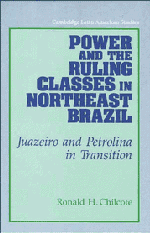Book contents
- Frontmatter
- Contents
- List of tables and figures
- Preface
- PART I THE TRADITIONAL SERTÃO
- 1 The background
- 2 The structure of power and the ruling class
- 3 Juazeiro: cohesion and factionalism
- 4 Petrolina: patriarchy and family dominance
- 5 The ruling class and the polity
- 6 The ruling class and the economy
- 7 The ruling class in civic and social life
- 8 Ideology
- 9 Development and underdevelopment
- 10 Participation, mobilization, and conflict
- PART II THE SERTÃO REVISITED
- Appendix
- Bibliography
- Index
- CAMBRIDGE LATIN AMERICAN STUDIES
5 - The ruling class and the polity
from PART I - THE TRADITIONAL SERTÃO
Published online by Cambridge University Press: 30 September 2009
- Frontmatter
- Contents
- List of tables and figures
- Preface
- PART I THE TRADITIONAL SERTÃO
- 1 The background
- 2 The structure of power and the ruling class
- 3 Juazeiro: cohesion and factionalism
- 4 Petrolina: patriarchy and family dominance
- 5 The ruling class and the polity
- 6 The ruling class and the economy
- 7 The ruling class in civic and social life
- 8 Ideology
- 9 Development and underdevelopment
- 10 Participation, mobilization, and conflict
- PART II THE SERTÃO REVISITED
- Appendix
- Bibliography
- Index
- CAMBRIDGE LATIN AMERICAN STUDIES
Summary
Two strains of rule predominate in the history of Brazilian politics. A centralist tendency prevailed in the colonial and imperial periods: first under the control of governors who reported to the Portuguese monarchy; then directly under the Portuguese queen, who in 1807 had fled in the face of Napoleon's invading army to Rio de Janeiro; and later under the empire from 1822 to 1889. The other tendency was toward a dispersion of power and autonomy at the regional and local levels. During the colonial and imperial periods this decentralizing tendency was the consequence of local loyalties and the difficulty of long-distance communication. According to one interpretation, although the empire was defined strictly as a unitary state, “control over local power structure by the central government, as expressed through the administrative system, was negligible.”
The constitution of 1891 promulgated a federal system and the delegation of some power to the states. While the economy retained its agrarian orientation (and its dependence on foreign markets), politics revolved around the regional and local political bosses known as colonels. A system of personal alliances between these local leaders and the state governors reinforced the autonomy of the states in the face of presidential authority at the national level. Alliances between the governors of the states of São Paulo and Minas Gerais determined presidential rule during much of the Old Republic period. The central government was weak, and state administrators, “at the service of rural patriarchs,” took “priority over an only partially effective federal administration.”
- Type
- Chapter
- Information
- Power and the Ruling Classes in Northeast BrazilJuazeiro and Petrolina in Transition, pp. 113 - 140Publisher: Cambridge University PressPrint publication year: 1990



